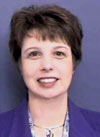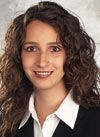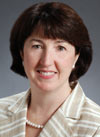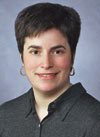 Wisconsin Lawyer
Wisconsin Lawyer
Vol. 80, No. 9, September 2007
In 2004, Milwaukee County Circuit Court Judge Rick Sankovitz visited the Milwaukee firm Whyte Hirschboeck Dudek (WHD) as part of the Milwaukee Bar Association's "Pro Bono Roadshow." That visit became the catalyst for a project through which the firm's lawyers are addressing a continuing need for pro bono legal services in a unique context.
 |
 |
| Camarata |
Jansen |
 |
 |
| Reynolds |
Zillig |
When an individual reaches age 18, the law presumes that he or she is an adult capable of making independent decisions, including those involving medical care. No exception is made for a developmentally disabled individual who lacks that capability. To continue making medical decisions on behalf of a child, a parent or other appropriate person must be legally appointed as the guardian of the child's person, as contrasted with the child's assets or estate. Judge Sankovitz, who had been alerted to this need by Children's Hospital, told the WHD lawyers that this problem might be tackled on a firmwide basis.
WHD lawyers Noleta Jansen and Molly Zillig (now with the Milwaukee County Corporation Counsel's office) picked up the ball. They worked with Judge Sankovitz and Sheila Reynolds and Jo Camarata (respectively vice president-general counsel and manager of family services at Children's Hospital of Wisconsin) to develop a guardianship clinic at Children's Hospital, with ongoing pro bono legal services provided by volunteer lawyers from WHD. Several other WHD lawyers also played roles in the clinic's development.
Recognizing that establishing this kind of guardianship was outside their regular practice, Jansen and Zillig turned to the late Alexandra Waeffler, of Nelson, Irvings & Waeffler, who was well-respected for her work in this substantive legal area. Waeffler provided invaluable training for the volunteers, helped to edit training materials, and acted as a sounding board as the clinic became active.
"For the Good" spotlight: Reports on pro bono in action
This new feature to this column recognizes the efforts of Wisconsin lawyers who donate their time and professional skills to individuals with legal needs who are unable to pay for a lawyer, and to projects serving those individuals. Developed and written by Wisconsin Lawyer editorial board members Alyson Zierdt, Oshkosh, and Dick Ricci, Eau Claire, look for "Spotlight" profiles in alternating months.
Do you know of a lawyer or local project that illustrates "Wisconsin Lawyers Making a Difference" through the gift of time and talent? Send your suggestions to: wislawyer@wisbar.org; subject line: pro bono spotlight.
Jeaneen Dehring, also of the Milwaukee County Corporation Counsel's office, was another key resource for procedural issues. Zillig has joined Dehring in assisting the clinic with procedural issues. Probate court personnel from Milwaukee and Waukesha counties have also provided assistance.
Children's Hospital family services personnel screen individuals for eligibility for guardianship clinic services. The child must be a patient at Children's Hospital, at least 17 years and 9 months old, and demonstrate an inability to make his or her own medical decisions due to a cognitive disability, as documented by a physician or psychologist.
The family must be in financial need, with the patient receiving Medicaid (T-19) or GAMP (General Medical Assistance Program for qualified Milwaukee County residents), and must live in Milwaukee or Waukesha County.
All parties involved must agree to the guardianship.
Clinics are held once a month with alternating morning and evening hours. WHD volunteer lawyers, who currently number 20, meet with the families, prepare necessary documents, follow up with doctors as needed, represent the families at guardianship hearings, obtain letters of guardianship, and review future reporting requirements with the families.
The guardianship clinic opened in December 2005. Twelve guardianships have been established, and another is in progress. Major changes to the guardianship law in December 2006 temporarily slowed the clinic's progress, but the volunteers have risen to the challenge.
Jansen recruits the clinic's volunteer lawyers and provides other administrative services, and WHD has absorbed costs incurred to date, such as for filing fees and service of process.
The need for similar services exists statewide. Jansen and WHD are compiling a handbook that could be a resource for lawyers interested in setting up similar clinics in partnership with local hospitals. To address this serious need, Jansen is willing to share with other lawyers what WHD has learned. Contact Jansen.
Wisconsin Lawyer
